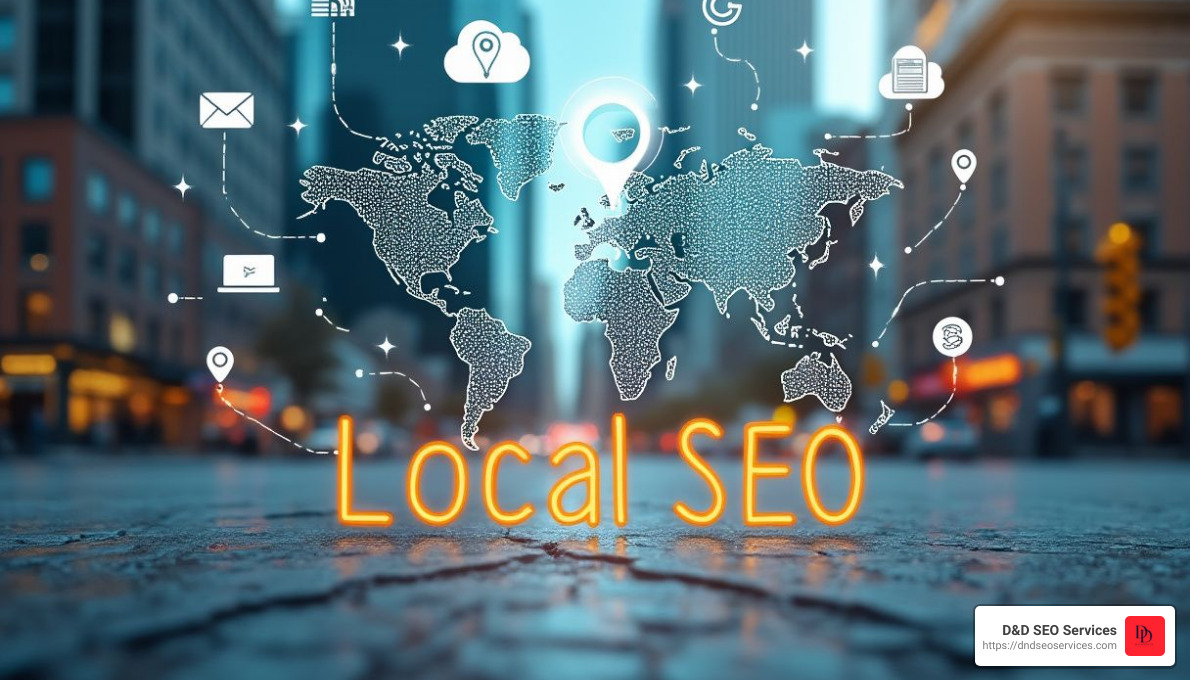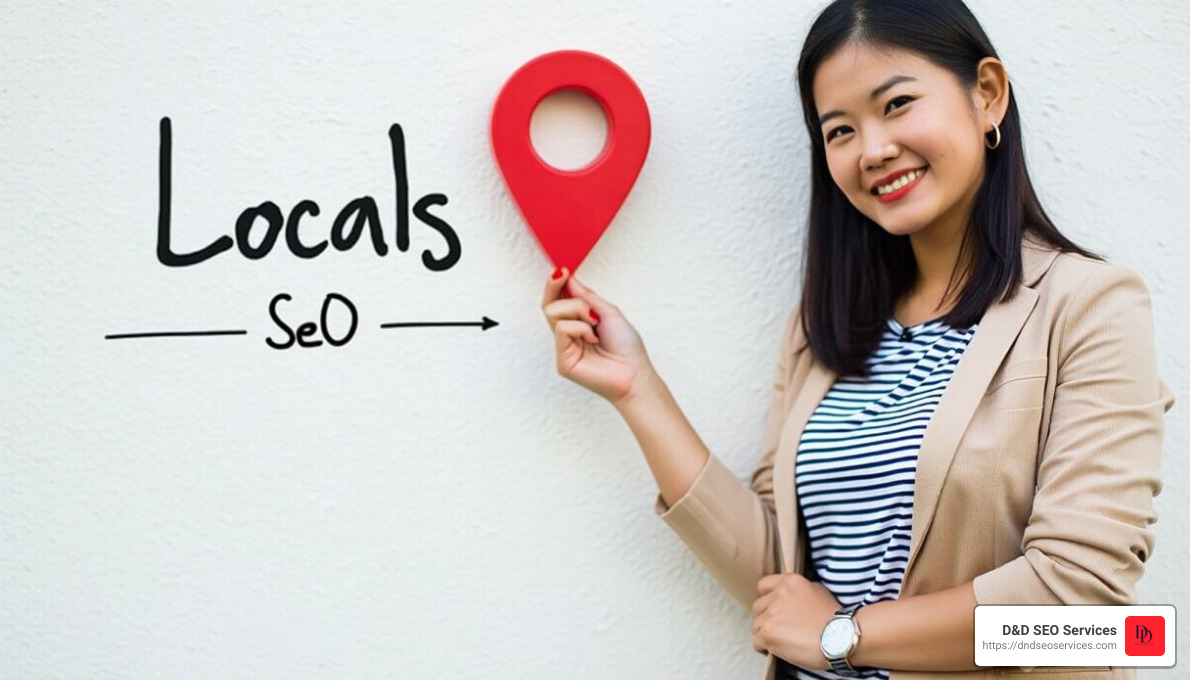The Crucial Role of Local SEO in Real Estate
Local SEO for real estate agents is critical in today’s digital landscape. It’s what helps your business get found online when potential clients are searching for properties or services in your area. Here’s a quick summary of how local SEO for real estate agents can lift your business:
- Improves Visibility: Ensures your site shows up in local search results.
- Increases Traffic: Drives more targeted visitors to your website.
- Generates Leads: Connects you with clients who need your services right now.
- Builds Trust: Establishes credibility and authority in your local market.
In an ever-growing real estate market, having a robust online presence is not just a competitive edge; it’s a necessity. With the majority of homebuyers turning to the internet, mastering SEO can make or break your business.
I’m Danielle Birriel, founder and CEO of D&D SEO Services. For the past ten years, I’ve been helping local businesses like yours thrive by leveraging effective strategies in local SEO for real estate agents.
Basic local seo for real estate agents glossary:
- Local SEO Keyword Research
- Local SEO Ranking Factors
- Why Map Rankings Matter in Online Business Success
Understanding Local SEO for Real Estate Agents
Local SEO is a specialized branch of search engine optimization that focuses on improving a business’s visibility in local search results. For real estate agents, this means showing up when potential clients search for properties or real estate services in your area.
What is Local SEO?
Local SEO targets location-based searches. When someone types “real estate agents near me” or “homes for sale in [Your City]” into Google, local SEO strategies help ensure your business appears in those search results.
Why Visibility Matters
Visibility is crucial. The National Association of Realtors reported that 97% of homeowners used the internet to search for new homes. If your real estate business isn’t visible online, you’re missing out on a huge pool of potential clients.
How Search Engines Work
Search engines like Google use complex algorithms to determine which websites appear in search results. These algorithms consider many factors, including:
- Relevance: How well your content matches the search query.
- Proximity: How close your business is to the searcher.
- Prominence: How well-known and trusted your business is online.
Local SEO aims to optimize these factors to improve your rankings in local search results.
Key Components of Local SEO
- Google Business Profile (GBP): One of the most effective tools for local SEO. A well-optimized GBP can help you appear in the Local Pack—the top three local search results on Google.
- Local Keywords: Using keywords specific to your location helps search engines understand where your business operates.
- Backlinks: Links from other reputable local websites signal to Google that your site is trustworthy.
- Online Reviews: Positive reviews boost your credibility and can improve your local search rankings.
- NAP Consistency: Ensure your Name, Address, and Phone number are consistent across all online platforms.
Real Estate SEO in Action
Imagine a potential client searching for “luxury condos in Miami.” With effective local SEO, your business could be one of the first results they see.
Real-World Impact
A case study by D&D SEO Services showed that optimizing a real estate agent’s local SEO led to a 40% increase in website traffic and a 30% boost in client inquiries within six months.
By understanding and implementing local SEO, you can significantly improve your online visibility, attract more clients, and dominate your local market.
Next, we’ll dive into the specifics of optimizing your website for local SEO, including keyword research, on-page SEO, and ensuring NAP consistency.
Why Local SEO Matters for Real Estate Agents
In the highly competitive real estate industry, standing out in local search results can make all the difference. Here’s why local SEO for real estate agents is essential:
Local Search Results
When potential clients search for real estate services, they often include location-specific terms like “real estate agents in [Your City]” or “homes for sale near me.” Local SEO helps ensure your business appears in these searches.
Fact: According to the National Association of Realtors, 97% of homeowners used the internet to search for new homes. If your business isn’t showing up in local searches, you’re missing a significant opportunity.
Client Conversion
Appearing at the top of local search results isn’t just about visibility. It’s about converting that visibility into actual clients.
Case Study: D&D SEO Services optimized a real estate agent’s local SEO, resulting in a 40% increase in website traffic and a 30% boost in client inquiries within six months. This shows that effective local SEO can directly impact your bottom line.
Brand Credibility
Being prominently featured in local search results builds trust with potential clients. People are more likely to choose a real estate agent who appears authoritative and well-established in their area.
Statistic: Positive online reviews can improve your local search rankings and boost your credibility. Encouraging satisfied clients to leave reviews can significantly improve your online reputation.
Real-World Example
Imagine a potential buyer searching for “luxury condos in Miami.” If your business is optimized for local SEO, you could be one of the first results they see. This not only increases the chances of them visiting your website but also contacting you for their real estate needs.
The Local Pack Advantage
One of the most coveted spots in local search results is the Google Local Pack—the top three local listings that appear prominently on the search results page. Optimizing your Google Business Profile (GBP) is crucial for getting into the Local Pack.
Tip: Ensure your GBP is fully optimized with accurate business information, high-quality photos, and regular updates to improve your chances of appearing in the Local Pack.
By mastering local SEO, real estate agents can greatly improve their online presence, attract more qualified leads, and establish themselves as trusted authorities in their local markets.
Next, we’ll dive into the specifics of optimizing your website for local SEO, including keyword research, on-page SEO, and ensuring NAP consistency.
Optimizing Your Website for Local SEO
Conducting a Real Estate SEO Audit
Before diving into any SEO improvements, it’s crucial to understand your website’s current performance. A thorough SEO audit provides a clear snapshot of your digital footprint, highlighting both high-performing pages and areas needing improvement.
Key Areas to Focus On:
Site Structure: Ensure your XML sitemap is up-to-date and submitted to search engines. Check your robots.txt files to see what parts of your site are being crawled or ignored. Identify and fix any broken or unnecessary redirects.
Page Elements: Optimize titles, meta descriptions, and headings to include relevant keywords. Use alt tags for images to make them accessible and improve your SEO.
Content Quality: Assess your content for organization, keyword usage, link integration, and visual content. Avoid duplicate content and use canonical tags where necessary.
Link Health: Analyze both inbound and outbound links. Ensure internal links are logical and helpful. Identify and fix any broken links.
User Experience: Ensure your site is accessible, mobile-friendly, and fast-loading. A good user experience can lead to significant gains in organic traffic.
Mobile Optimization
A mobile-friendly website is a must. More searches are performed on mobile devices than on desktops, making mobile optimization crucial for local SEO success.
Responsive Design: Ensure your site looks great and functions seamlessly on mobile devices. This includes having tappable buttons, readable fonts, and simple forms.
Mobile-Friendly: Use Google’s Mobile-Friendly Test tool to determine if your site meets mobile usability standards. This tool provides a list of issues that need attention.
Site Speed: Speed is key. Use tools like Google’s PageSpeed Insights to identify and fix slow-loading elements. Faster load times lead to a better user experience and higher search engine rankings.
Keyword Research
Keyword research forms the backbone of any successful local SEO campaign for real estate agents. Focus on identifying long-tail keywords that potential buyers or renters frequently use in their searches.
Long-Tail Keywords: Instead of targeting broad terms like “realtor,” focus on more specific phrases like “best realtor in [city name].” These keywords are less competitive and more likely to convert.
Search Volume and Competition Levels: Balance high search volume with manageable competition levels. Use tools like Google Keyword Planner to find relevant keywords.
On-Page SEO
On-page SEO involves optimizing individual pages to rank higher and earn more relevant traffic in search engines.
Optimized Titles and Meta Descriptions: Include relevant keywords to improve click-through rates. Tailor each page’s meta titles and descriptions to include local search terms.
Headings (H1, H2, etc.): Use headings to structure your content logically. This makes it easier for both users and search engines to understand your content.
Alt Tags for Images: Make your images accessible and improve your SEO by using descriptive alt text that includes locally relevant keywords.
NAP Consistency
Consistency in your business’s Name, Address, and Phone number (NAP) across all online listings is crucial for local SEO.
Accurate Information: Ensure your NAP information is consistent across your website, Google Business Profile, and other directories. Inconsistent information can confuse search engines and potential clients.
Monitoring Tools: Use tools to monitor your NAP information across various listings to ensure accuracy.
By focusing on these areas, you can make your real estate website more inviting and efficient for mobile users, enhancing both user experience and SEO performance.
Next, we’ll explore the importance of Google My Business optimization, including setting up and verifying your profile, and managing reviews.
Google My Business Optimization
Setting Up and Verifying Your GMB Profile
Setting up and verifying your Google My Business (GMB) profile is a crucial step in local SEO for real estate agents. This free tool helps you manage how your business appears on Google Search and Maps.
1. Claim Your Business:
First, search for your business on Google to see if a listing already exists. If it does, claim it. If not, create a new listing.
2. Provide Accurate Information:
Ensure every detail is accurate and consistent with your website and other online profiles. This includes your business name, address, phone number, and website (NAP). Inconsistent information can confuse search engines and hurt your rankings.
3. Select Appropriate Categories:
Choose categories that best describe your services, like “Real Estate Agency” or “Property Listings.” This helps potential clients find you during specific searches.
4. Verification:
Google typically verifies your business by sending a postcard with a PIN to your business address. Alternatively, you may have the option to verify via phone or email for quicker verification.
5. High-Quality Images:
Upload professional photos of your properties, office, and team. According to Google, listings with photos receive 42% more requests for directions and 35% more clicks to their websites.
Encouraging and Managing Reviews
Reviews are a significant factor in local SEO rankings and can greatly influence potential clients’ decisions.
1. Encourage Positive Reviews:
Ask satisfied clients to leave reviews on your GMB profile. You can do this via follow-up emails or during the closing process. Positive reviews build trust and improve your local search rankings.
2. Respond to Reviews:
Engage with both positive and negative reviews. Thank clients for their positive feedback and address any issues raised in negative reviews calmly and constructively. This shows potential clients that you value feedback and are committed to excellent service.
3. Monitor Your Reviews:
Regularly check your GMB profile for new reviews. Timely responses can make a significant impact on your reputation and client trust.
4. Highlight Client Feedback:
Feature positive reviews on your website and social media. This not only builds credibility but also encourages more satisfied clients to leave their own reviews.
By optimizing your GMB profile and actively managing reviews, you can significantly boost your visibility and reputation in local searches, making it easier for potential clients to find and trust your services.
Next, we’ll explore the importance of Creating Localized Content, including blogging about local market trends and using local keywords.
Creating Localized Content
Creating localized content is essential for connecting with your community and boosting your local SEO for real estate agents. Let’s explore two key strategies: blogging about local market trends and using local keywords.
Blogging About Local Market Trends
Blogging is a powerful way to showcase your expertise and attract local clients. Here are some effective topics:
Market Analysis
Market analysis posts position you as a local expert. Share insights on current market conditions, price trends, and housing inventory. For example, a blog titled “Q3 Housing Market Update for Austin” can provide valuable data and attract potential buyers and sellers.
Example: An agent in Austin regularly updates their blog with market reports, leading to a 30% increase in website traffic over six months.
Community Insights
Write about community events and local happenings. This not only engages your audience but also signals to search engines that your site is relevant to local searches.
Ideas for posts:
- Upcoming Events: “Top 5 Fall Festivals in Austin”
- Local Spotlights: “Interview with Austin Business Owner”
- Neighborhood Guides: “Living in Downtown Austin: A Complete Guide”
Example: A blog post about a local charity event sponsored by a real estate agent can attract backlinks from event websites, boosting your SEO.
Using Local Keywords
Local keywords help search engines understand the geographic focus of your content. Here’s how to use them effectively:
Keyword Integration
Integrate local keywords naturally into your blog posts, property descriptions, and other website content. This helps search engines match your site to relevant local searches.
Examples of local keywords:
- Homes for sale in Downtown Austin
- 3-bedroom houses in Austin
- Pre-construction condos in Austin
Tip: Use tools like Google Related Searches and WordStream to find relevant long-tail keywords.
Search Intent
Understanding search intent is crucial. People searching for “single-family homes in Downtown Austin” are likely ready to buy. Tailor your content to meet these specific needs.
Example: A blog post titled “Top 10 Single-Family Homes for Sale in Downtown Austin” can attract high-intent buyers.
Fact: Around 70% of Google searches are long-tail keywords, making them a goldmine for local SEO.
By focusing on blogging about local market trends and effectively using local keywords, you can create valuable content that resonates with your audience and improves your search rankings.
Next, we’ll explore the importance of Building and Managing Local Citations, including maintaining consistent NAP information across all platforms.
Building and Managing Local Citations
Consistent NAP Information
Building and managing local citations is a cornerstone of local SEO for real estate agents. One key aspect is ensuring your Name, Address, and Phone number (NAP) information is consistent across all platforms.
Local Directories
Listing your business in reputable local directories like Yelp, Yellow Pages, and real estate-specific platforms can significantly improve your local search visibility. These directories help search engines verify your business details and improve your credibility.
Fact: Businesses with consistent NAP details across multiple directories rank higher in local search results. Source
NAP Consistency
Consistency in your NAP information is crucial for search engine trust and user experience. If your NAP details are mismatched, it can confuse search engines and potential clients.
Pro Tip: Verify that your NAP details are correct on your website, social media profiles, and all online directories.
Example: A business that corrected its NAP inconsistencies saw a 20% increase in local search traffic within three months.
Citation Tools
Using citation tools can simplify managing your local citations. Tools like Moz and SEMrush can help you track and maintain your NAP information across various platforms. These tools search for your business listings and identify any inconsistencies.
Fact: Citation tracking tools can automate the process of finding and fixing NAP inconsistencies.
Accuracy and Monitoring Tools
Regularly auditing your citations is essential to ensure accuracy. Monitoring tools like BrightLocal’s Citation Tracker can help you take a snapshot of your current citations and identify any discrepancies.
Pro Tip: Regular audits can prevent duplicate citations, which can confuse search engines and hurt your local SEO.
Example: A real estate agent who used BrightLocal to audit their citations corrected several inconsistencies, leading to improved local search rankings.
By focusing on building and managing local citations and ensuring consistent NAP information, you can improve your local search visibility and attract more clients.
Next, let’s explore the importance of leveraging social media for local SEO.
Leveraging Social Media for Local SEO
Creating and Sharing Local Content
Engaging with your community through social media is a powerful way to boost your local SEO for real estate agents. Sharing local content helps you connect with potential clients and shows that you are an active part of the community.
Blog Posts and Property Listings
Share your blog posts and property listings on platforms like Facebook, Instagram, and Pinterest. This not only drives traffic to your website but also keeps your audience informed and engaged.
Example: A real estate agent in Austin posted a blog about the “Top 10 Schools in Austin” on their Facebook page. This blog received high engagement and was shared multiple times, increasing traffic to their website.
Local News and Events
Posting about local news and events helps you stay relevant. Share updates about community events, market trends, and neighborhood highlights.
Example: An agent shared news about a local fair on Instagram, adding value to their followers and showing they are in touch with the community.
Utilizing Local Hashtags
Using local hashtags can significantly improve your reach. Hashtags like #AustinRealEstate or #DallasHomesForSale make it easier for potential clients to find your content when they search for local information.
Targeted Audience
Local hashtags attract a more targeted audience. People searching these hashtags are likely interested in real estate in your area.
Example: An agent in Houston used #HoustonLiving in their posts, attracting local followers and potential clients interested in Houston properties.
Increased Reach
Using a mix of broad and specific hashtags can widen your audience. Broad hashtags like #RealEstate can attract a general audience, while specific ones like #3BedroomHouseAustin can target those looking for specific property types.
Pro Tip: Research popular local hashtags in your area and incorporate them into your posts for maximum visibility.
By creating and sharing local content and utilizing local hashtags, you can effectively engage with your community and improve your local SEO. This strategy helps you stay visible, relevant, and credible in the marketplace.
Next, let’s explore the importance of building local links to boost your SEO efforts.
Backlink Building for Real Estate SEO
Building strong backlinks is essential for local SEO for real estate agents. Backlinks from reputable sites signal to search engines that your content is trustworthy and valuable. Here are some effective strategies:
Guest Posts
Writing guest posts on local blogs or real estate websites can earn you valuable backlinks. By sharing your expertise on these platforms, you not only gain visibility but also establish yourself as a local authority.
Example: An agent in Seattle wrote a guest post about “Emerging Neighborhoods in Seattle” for a local lifestyle blog. This post included a link back to their website, driving traffic and improving their SEO.
Local Collaborations
Collaborating with local businesses is another excellent way to build backlinks. Partner with local cafes, gyms, or schools to create content that benefits both parties.
Example: A real estate agent in Brooklyn teamed up with a local bakery to create a blog post titled “Best Bakeries in Brooklyn Near Your New Home.” The bakery’s website linked back to the agent’s site, enhancing both businesses’ online presence.
High-Quality Content
Creating high-quality content on your own site can naturally attract backlinks. When your content is informative and valuable, other websites will want to reference it.
Example: An agent in Denver created an in-depth guide on “Navigating the Denver Real Estate Market.” This comprehensive guide was frequently cited by local news outlets and blogs, earning multiple backlinks.
Tips for Creating High-Quality Content:
- Use Data and Statistics: Include local market data and trends.
- Visuals: Add high-quality images, infographics, and videos.
- Detailed Guides: Write thorough guides on buying or selling homes in specific neighborhoods.
Community Engagement
Engaging with your community through local events can also lead to backlinks. Participate in or sponsor local events, and get mentioned on event websites.
Example: An agent sponsored a local charity run. The event’s website listed all sponsors and linked back to the agent’s site, boosting their SEO.
Pro Tip: Always ensure your NAP (Name, Address, Phone number) information is consistent across all backlinks to maximize their SEO impact.
By focusing on guest posts, local collaborations, and high-quality content, you can build a robust backlink profile that improves your local SEO for real estate agents. This will help you rank higher in search results and attract more potential clients.
Next, let’s explore how to create localized content to further improve your online presence.
Frequently Asked Questions about Local SEO for Real Estate Agents
Does local SEO work for real estate agents?
Absolutely! Local SEO for real estate agents is incredibly effective. Here’s why:
- Visibility: Local SEO helps you appear in search results when people look for real estate services in your area. For example, ranking for “homes for sale in Texas” or “real estate agents in New Jersey” can drive targeted traffic to your site.
- Trust: When potential clients see your business in local search results, it builds trust. Positive reviews and high ratings on platforms like Google My Business add to this trust.
- Lead Generation: Local SEO attracts people who are actively looking to buy or sell property in your area. This means higher quality leads and better conversion rates.
A study found that 97% of homeowners use the internet to search for new homes, making local SEO a crucial strategy for real estate agents.
How much does real estate SEO cost?
The cost of real estate SEO can vary widely based on several factors:
- Scope of Services: Basic services like keyword research and on-page optimization might be cheaper, while comprehensive packages including content creation, backlink building, and ongoing monitoring will cost more.
- Agency Expertise: More experienced agencies may charge higher fees, but they often deliver better results.
- Location and Competition: If you’re in a highly competitive market, you might need to invest more to achieve top rankings.
On average, real estate agents can expect to spend anywhere from $500 to $5,000 per month on SEO services. It’s essential to view this as an investment. Effective SEO can generate leads 24/7, providing a significant return on investment over time.
How to use SEO for real estate business?
Using SEO for your real estate business involves several key steps:
- Keyword Research: Identify the keywords potential clients are using. Focus on long-tail keywords specific to your market, like “luxury homes for sale in Miami” or “first-time homebuyer tips in Austin.”
- Optimize Your Website: Ensure your website is mobile-friendly, fast-loading, and has a clear structure. Use local keywords in your titles, meta descriptions, and content.
- Google My Business: Set up and verify your Google My Business profile. Add high-quality images, complete all business information, and encourage clients to leave reviews.
- Create Localized Content: Write blog posts about local market trends, community events, and neighborhood guides. This not only helps with SEO but also positions you as a local expert.
- Build Local Citations: Ensure your NAP (Name, Address, Phone number) is consistent across all online directories. This boosts your local search rankings.
- Backlink Building: Collaborate with local businesses and write guest posts to earn backlinks. High-quality content on your site can also attract links from other websites.
By following these steps, you can improve your online presence, attract more local clients, and ultimately grow your real estate business.
Next, let’s explore how to create localized content to further improve your online presence.
Conclusion
Choosing the right local SEO agency can transform your real estate business. At D&D SEO Services, we specialize in personalized strategies custom to the unique needs of real estate agents. Here’s why partnering with us can help you dominate your local market:
Personalized Strategies
Every real estate business is unique. That’s why we create customized SEO plans that address your specific goals and challenges. Whether you’re looking to optimize your Google Business Profile or improve your local keyword targeting, we’ve got you covered.
Expertise in Local Markets
With years of experience in local SEO, we know what works. Our team uses proven techniques to improve your online visibility, attract more local customers, and build a strong brand presence. From on-page content optimization to online review management, we handle it all.
Sustainable Online Growth
Our comprehensive approach ensures your business not only ranks higher but sustains its position. We continuously update and optimize your SEO strategy to keep you ahead of the competition. This leads to long-term growth and a steady stream of high-quality leads.
Improved ROI
Investing in local SEO with D&D SEO Services can lead to significant returns. Increased local traffic, higher conversion rates, and reduced advertising costs are just a few of the benefits you can expect. Our goal is to provide you with a robust online presence that drives real results.
Partnering with us means more than just better rankings; it means building a strong local brand that resonates with potential clients in your community.
Ready to take your local SEO to the next level? Contact D&D SEO Services today and let’s start optimizing your business for success.
By focusing on these key areas, we help real estate agents thrive in their local markets, ensuring sustained growth and improved customer relationships. Thank you for reading our comprehensive guide to local SEO for real estate agents. We hope you found it helpful and informative.









